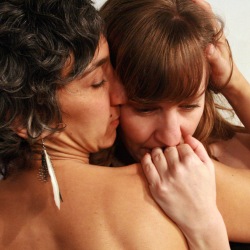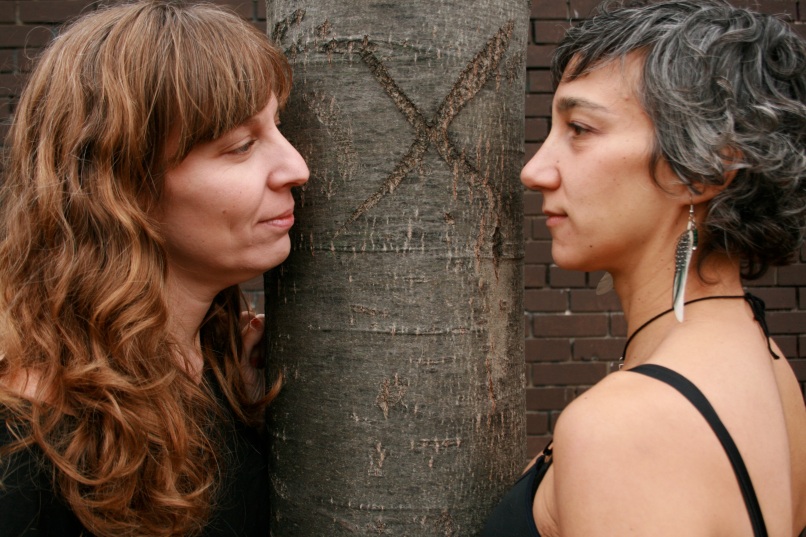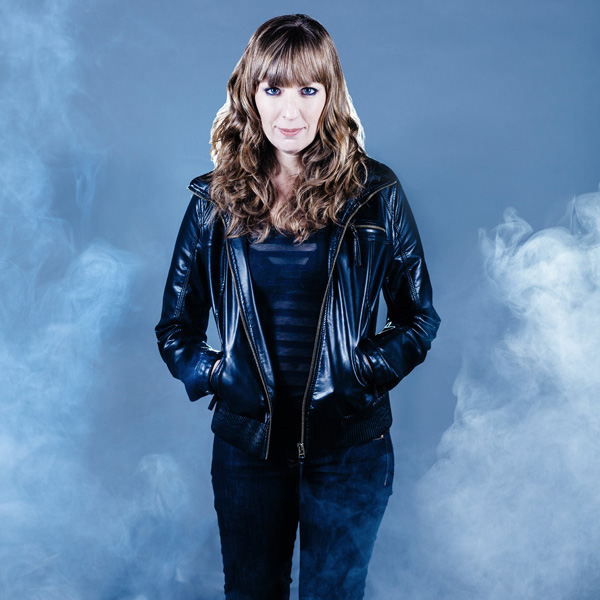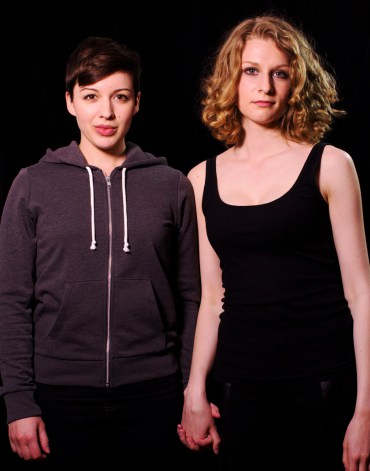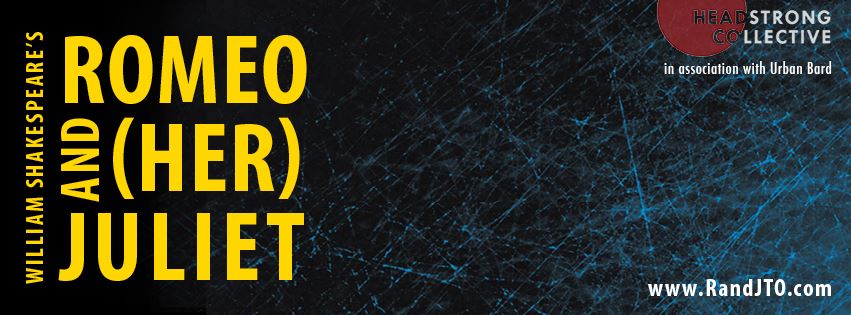The Sex Ed Curriculum, Plays in Threes & Making a Statement with a Dildo – In Conversation with Rob Kempson, Playwright/Director of SHANNON 10:40
Interview by Brittany Kay
Brittany Kay: Tell me about your title character Shannon and SHANNON 10:40?
Rob Kempson: Shannon, the character, was born out of my work as a teacher and meeting students who don’t feel like they are welcomed in the environment of school. I’ve taught in a lot of settings where they are welcomed and that is truly amazing, like if you look at an arts school, for example, and the amount of students who are queer or questioning or in some of sort in-between place with their sexual identity or gender identity, those schools tend to be leaning towards a more supportive side. What was most interesting to me were kids who are incredibly confident with their sexuality and are able to talk about it openly, and the way that other kids in school respond to that kind of confidence and power. I was not one of those kids. After creating Shannon, I started thinking about myself as a queer teacher and the challenges associated with that in this day and age. I thought putting those two people on stage together might create an interesting dynamic.
BK: What has been your inspiration for writing this show?
RK: I’m producing two plays of mine this year. SHANNON 10:40 is the first one before the holidays and the second one is called Mockingbird, which will be in the Next Stage Theatre Festival in January 2016. They are part of a series that I’m calling The Graduation Plays. I think that I tend to work in threes. I kind of get obsessed with an idea for a little while and hang out with that idea in my brain. I’ve been teaching for a long time and so I’ve obviously always thought about school settings but for SHANNON 10:40 and Mockingbird, it was just their time in my brain to come into being. I was ready for them to exist. Jokingly, 2014 was the year of Grandmas for me. I did a musical that was about a grandma (The Way Back To Thursday) and then I did a piece at Hatch that featured three grandmas (#legacy). I don’t think my grandma phase is over, perhaps, but I’d like to think that now I’m on to my school phase.
Once I get interested in a given environment or topic, I want to explore that from a lot of different places before I’m done with it and sometimes you can’t fit all of that into one play, so it becomes two plays.
BK: Is there a third one in your series?
RK: I think there’s a third play… and I think I know what it’s about. I certainly didn’t imagine I would get into Next Stage this year and also get to produce SHANNON 10:40 this year, so the fact that they are being presented so close together is very exciting. I feel really lucky.
BK: Why the title of the series – The Graduation Plays?
RK: I always thought of them as a series and then a smart publicist friend of mine told me that I needed to name it as a series if it’s going to be one. Of course, initially what came to my mind was the Education Plays and I thought, “well that sounds stupid,” and then I thought that that’s not actually what this is about. It’s about all of us as an education community but also us as a world advancing in some way. Getting to somewhere that we weren’t before. That’s what graduation is in theory and I think I imagine these plays to both showcase characters and situations that challenge what we expect and challenge what we understand to be acceptable.
I think that there are so many examples of students taking back power because they need to act out, they need to say they’re not happy, they need to stand up for themselves… there’s a lot of different reasons. The term ‘graduation’ is kind of about all of that – it’s about moving forward and understanding something new. Both plays have that sort of characteristic to them.
BK: How has teaching, being in a school environment, and around these types of students influenced your writing?
RK: I feel so lucky that I get to work as an artist educator and as an artist because those two streams for me are incredibly important in my life, in my career, and they ultimately inform one another. So things that I’m working on in my artistic practice often end up infiltrating my work as an artist educator and vice versa. Things that happen in my practice as an artist educator always make their way into my writing. There’s this real sort of back and forth between those two parts of my brain.
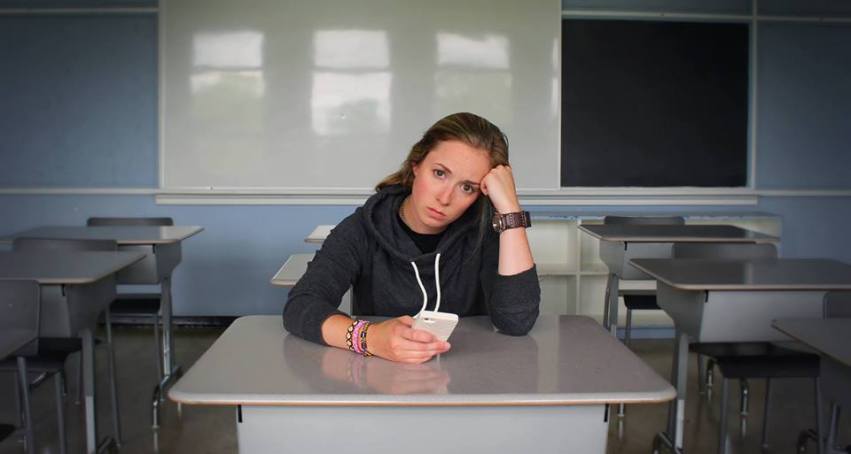
Hallie Seline as Shannon in SHANNON 10:40
BK: Why 10:40?
RK: Oh, because that’s the time of Shannon’s guidance appointment. She’s going to a guidance appointment at 10:40. It’s not like 4.48 Psychosis or anything crafty. It’s literally the time of her guidance appointment. The timeline is all about the school day and 10:40 is midway through second period, it’s right before lunch and she’s been called out of class to come to this guidance appointment. There’s a very different kind of day for students because school starts so early in the morning and ends so early in the afternoon.
BK: This play is very timely and appropriate for what some are calling The Education Crisis that is going on.
RK: Yes. It’s not really brain surgery though… Oh, the world changes but we’ve done the exact same thing for a very long time? If we expect to be relevant and expect to connect with our students and we expect to have our education system actually do anything for the community that we live in, it needs to change with the world. The bureaucracy that prevents it from doing so is, in fact, the problem. We need to be able to respond quickly with curriculum development. We need to give teachers enough autonomy to be able to work with the curriculum in an innovative and progressive way, but we also need to be able to support them as they make those choices. The message of Shannon 10:40 is definitely political in scope in the sense that a teacher, Mr. Fisher, is dealing with this desire to be a progressive forward thinking teacher and he’s not receiving the support that he needs to in order to do that effectively. Shannon is a student who’s caught in the cross-fire, not feeling represented in her school, not feeling represented in her classes that she has to take and, therefore, feeling oppressed. She is feeling like she is the victim of oppression in her everyday life as a student and so, of course, she’s going to do something to change that, because she has to.
I think the play is about students figuring out a way to state their case, to share their message, to say what they need to say—and students don’t always do that in the most appropriate way. That’s what it’s about: a student taking back the power and fighting the oppression of that system.
BK: Tell me you’re inviting Kathleen Wynne because this is so timely around what is happening right now in the world of education.
RK: I do have dreams of doing so. I’m definitely inviting some folks who are into education pedagogy and hoping we’ll be able to have a discourse around that.
BK: I think that’s what theatre is about… that, often it needs to reflect what’s happening in our day-to-day.
RK: I agree. I also think that we don’t give students tools to talk about or react to oppression, but we then oppress them. If we’re not teaching them how to react to that in a way that’s appropriate, how can we expect anything but outbursts, outrage and acts of defiance because they need to be heard. They need to say what they feel.
I think the last great bastion to knock down in a school setting is really around sexual and gender diversity and it’s way better than it used to be. It’s not like we aren’t making progress but it’s when in that progress that we need to recognize we’re never done… We still need to work. We still need to continue and develop.
BK: What do you want audiences walking away with from SHANNON 10:40?
RK: Hopefully, a new perspective in their toolkit when they’re thinking about the way that education works in this province. And, also, that they got to see a show with a dildo in it! We haven’t even said that—Shannon brings a dildo to school.
Rapid Fire Question Period:
Favourite movie: Sister Act 2.
Play: Impossible to choose… You Are Here by Daniel MacIvor?
Musical: Elegies.
Food: Cheese.
TV Show: Please Like Me.
Book: Favourites are so hard… I don’t like the commitment… The Interestings by Meg Wolitzer
Best advice you’ve ever gotten or something you live by: This is where I find myself. You have to be happy where you are.
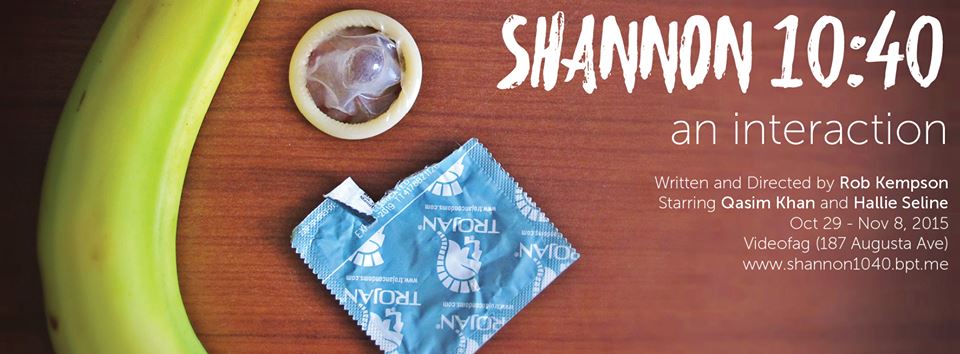
Who: Written and Directed by Rob Kempson
Featuring Qasim Khan and Hallie Seline
Set and Costume Design by Anna Treusch
Lighting Design by Oz Weaver
Sound Design by Daniel Maslany
When: Wed‐Sat at 8pm, Sun at 2pm
Where: Videofag, 187 Augusta Avenue, Toronto
Tickets: $20 or $15 for Artsworkers/Students. Plus a $10 Halloween ticket treat for Saturday October 31st at 8pm.
Available at shannon1040.bpt.me
Connect with us:
Rob Kempson – @rob_kempson #shannon1040
Brittany Kay – @brittanylkay
In the Greenroom – @intheGreenRoom_
*Disclaimer: Please note the editor’s personal involvement in the show has not affected the editing and content of this piece. The views of this interview are that of the interviewer and the subject.






